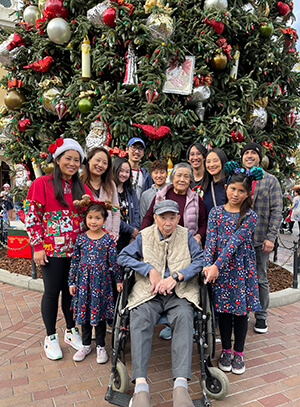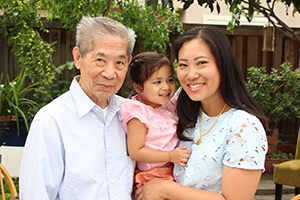Sang travels commonly from Southern California to the Bay Space to assist look after her dad, Quan, who has Alzheimer’s. Alongside together with her mother and three siblings, their household has come collectively to maintain him at dwelling so long as they’ll. After her father’s prognosis, Sang wished to do extra, and started volunteering as an Alzheimer’s advocate serving to the Asian American Pacific Islander (AAPI) group have a voice.
Breaking gender roles
Quan was born in China in 1935 in the course of the nation’s civil warfare. A gentle-mannered man, he’s gifted in seven languages, having lived all through many elements of Southeast Asia. As an immigrant to the USA, he all the time marveled on the magnificence and bountiful alternatives of his adopted homeland.
To be able to present for his or her household, Quan and his spouse Chanh labored. As a result of Chanh labored the late shift, Quan was usually the one staying dwelling with their children, cooking dinner, cleansing the home and signing permission slips. “He was the mild soul,” stated Sang, Quan’s second oldest baby. “He was an instance of gender equality earlier than we understood the idea. That was a present, to have extra gender stability in a standard marriage. I used to be all the time pleased with my dad for exemplifying that.”
Quan spent 25 years working as a grocer. When his children have been youthful, he’d ask them to assist him spell phrases like “watermelon” for show indicators. Whereas Quan liked his job, having solely a sixth-grade schooling, he wished extra for his kids. He made certain they understood the significance of schooling, and all 4 of his children obtained faculty levels, with Sang incomes a PhD in Public Well being.
Sang says, “After I look again at Dad’s life, an actual metric is – elevate a household, elevate good children and grandkids in a rustic he immigrated to. He’s exemplary in that manner.”
Modifications in habits
Within the years earlier than Quan’s prognosis, his household had observed odd behaviors like repeating the identical story he learn from the newspaper, accusing others of stealing or having an aggressive habits. On the time, Quan was in his 80s, making the household not sure if this was a regular signal of getting old or if it was the truth is reminiscence loss.
In 2019, Sang introduced her dad to his main care physician, who requested him questions to check his reminiscence. “I keep in mind being within the examination room,” stated Sang. “The physician was asking fundamental questions comparable to, ‘The place do you reside?’ issues like that. When he bought to the query, ‘Who’s the president?’ He stated, ‘Clinton.’ It was 2019; Clinton was not president.”
Quan was recognized with Alzheimer’s and his household was advised he was already within the center levels of the illness.
House care
For the primary 12 months after his prognosis, life for Quan stayed comparatively the identical. Nonetheless, because the illness progressed, Quan would go on walks and are available again to the fallacious home, overlook the place he put issues and stopped with the ability to keep in mind if he had showered that day. It was clear to Sang and her household that their dad would wish extra assist.
Whereas Chanh was, and continues to be, Quan’s main caregiver, she is in her 70s and may’t absolutely look after Quan on her personal. Their 4 kids have been capable of pool their assets and rent a caregiver that involves the home to assist look after Quan 4 days every week. Moreover, the 4 kids take turns sleeping at their dad and mom’ home, so Chanh isn’t with out further assist.
Sang, who primarily resides in Southern California, flies again to the Bay Space for weeks at a time to assist look after her father. “All of us take turns and handle our shifts,” stated Sang. “We have now a Google calendar on our telephones. Everybody [except me] is native, 30-60 minutes away from the home. I’m the one which lives at dwelling part-time although I’m 50 and personal my own residence. After I’m right here, I’m right here for days or even weeks.”
Changing into and Advocate
After their father’s prognosis, Sang went to the web to study extra concerning the illness. There she found the Alzheimer’s Affiliation’s web site. Understanding the significance of newsletters from her personal work, Sang signed up for the Affiliation’s e-newsletter. When she noticed there was a necessity for advocates, she thought to herself, why not volunteer?
Alzheimer’s advocates drive policymakers to handle Alzheimer’s and different dementia, and enhance the lives of everybody affected by Alzheimer’s. Right now, Sang is a kind of volunteers working immediately with Congressman Eric Swalwell.
“That is how I will help my dad greater than [caregiving],” stated Sang. “I began going to Advocacy Day [in Sacramento] and have been going to Advocacy Discussion board [in Washington D.C.] for the final three years.
“I’m giving a voice to the group of people that can’t handle themselves. ;not converse, they must depend on everybody else. If we’re not those advocating, then who might be there for folks like him?”
Alzheimer’s within the AAPI group
Within the Asian American group, 59% of unpaid caregivers report offering help with private care, comparable to bathing, consuming or dressing. Greater than half (56%) of Asian Individuals imagine that vital lack of memoryor cognitive (comparable to considering or studying) capacity is a traditional a part of getting old. Nonetheless, regardless of being the quickest rising main racial group within the U.S., Asian Individuals are among the many least represented teams in scientific analysis.
In response to the U.S. Census, Asians make up greater than 15% of the California inhabitants, with a big share of them residing within the Bay Space. As a result of Quan and his household dwell within the Bay Space, they’re a part of the 12% of Asian Individuals that report that they’ve no boundaries to wonderful Alzheimer’s and dementia care.
Quan was lucky to have a main care physician that spoke Mandarin. Whereas Quan by no means mastered English, within the occasion he met with an English talking physician, he all the time had one in all his kids or his spouse close by to translate, even earlier than the Alzheimer’s prognosis.
“It’s all the time been like that,” stated Sang. “It’s by no means an issue as a result of it was all the time this fashion. Clarify what’s occurring, we’re the proxy. Once you’re so used to translating for relations all our lives it’s no downside 1747131354.”
Combating stigma
A language barrier isn’t the one cause various communities have problem accessing therapy and care. There’s a stigma within the AAPI group that having dementia is shameful. Households are embarrassed to confess their liked one is weak or reveals a weak point comparable to dementia for worry of how their household might be perceived.
Due to this stigma, Asian Individuals are much less more likely to report that they’ve the illness, resulting in much less correct knowledge and fewer doubtless that the AAPI group will obtain culturally related assets. Sang hopes that her work as an advocacy volunteer will assist repair this.
“I want there have been extra Asians [participating in Advocacy],” stated Sang. “Somebody must step up and do extra for these of us who can’t. After I went to State Advocacy Day, I appeared across the room and it’s largely older White folks doing this, which is ok, nevertheless it doesn’t characterize the demographic of individuals with [dementia] in California.
“There could also be variations in the best way [the AAPI community] responds [to treatments], or the best way caregiving is taken into account. Our households are impacted, and there must be cultural sensitivity to the work and the motion itself. Legislators and coverage makers [need to know] this is a matter, it’s non-partisan, and we have to be represented.
“We have now a scarcity of information within the [AAPI] group. It’s a tough matter for Asian households. A lot disgrace, nevertheless it’s nobody’s fault, nobody requested for Alzheimer’s. Even my mother reveals disgrace, [she says], ‘We are able to’t take Dad on the market or they’ll know!’ And!? Know what!? That is our life. It’s so imbedded in our tradition; we don’t air our laundry.”
Exhibiting grace
Sang and her household continues to look after Quan, now 90 years previous, at dwelling. “That’s the expectation, particularly for Asians and Chinese language,” stated Sang. “It’s not concerning the funds, or language [barrier], it’s cultural. Even earlier than [the Alzheimer’s], we all the time stated that we might preserve everybody at dwelling.”
Sang encourages different caregivers to teach themselves on the illness and provides their liked one some grace. “It’s a tough [disease],” stated Sang. “It’s a progressive illness. We’re going to see adjustments in behaviors and the way to reply. Life is difficult sufficient; we simply have to present one another grace on issues. Be affected person and empathetic.
“I attempt to consider [caring for my dad] as what we do with household, but in addition, it’s a privilege to assist in giving my dad the standard of life he deserves. We have now him with us nonetheless and know we’re doing what we will to maintain that.”
For extra info on Alzheimer’s and dementia within the Asian American Pacific Islander group go to alz.org/asianamericans.
To turn out to be an Alzheimer’s Affiliation advocacy volunteer, please go to alz.org/advocate.



